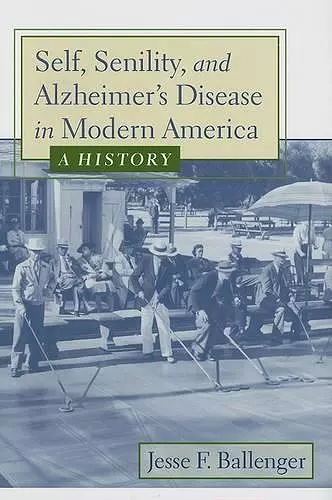Self, Senility, and Alzheimer's Disease in Modern America
A History
Format:Hardback
Publisher:Johns Hopkins University Press
Published:13th Apr '06
Currently unavailable, and unfortunately no date known when it will be back

No previous author has been able to weave together biomedical data, social science inquiries, policy issues, and popular attitudes while at the same time giving readers a sense of how victims of this dreaded disease (and those who love and care for them) think, feel, and behave. Ballenger's experiences as a caregiver and training as a historian of medicine provide the requisite insights to produce a book that will quickly become the standard work in the field. With this substantial, judicious piece of scholarship, Ballenger appropriately underscores the racial, class, and gender variations in the identification and care of the patient population. -- Andrew Achenbaum, University of Houston, author of Older Americans, Vital Communities
Ballenger's work contributes to our understanding of the emergence and significance of dementia as a major health issue.Historian Jesse F. Ballenger traces the emergence of senility as a cultural category from the late nineteenth century to the 1980s, a period in which Alzheimer's disease became increasingly associated with the terrifying prospect of losing one's self. Changes in American society and culture have complicated the notion of selfhood, Ballenger finds. No longer an ascribed status, selfhood must be carefully and willfully constructed. Thus, losing one's ability to sustain a coherent self-narrative is considered one of life's most dreadful losses. As Ballenger writes "senility haunts the landscape of the self-made man." Stereotypes of senility and Alzheimer's disease are related to anxiety about the coherence, stability, and agency of the self-stereotypes that are transforming perceptions of old age in modern America. Drawing on scientific, clinical, policy, and popular discourses on aging and dementia, Ballenger explores early twentieth-century concepts of aging and the emergence of gerontology to understand and distinguish normal aging from disease. In addition, he examines American psychiatry's approaches to the treatment of senility and scientific attempts to understand the brain pathology of dementia. Ballenger's work contributes to our understanding of the emergence and significance of dementia as a major health issue.
Both science and history blend in a survey of aging and dementia, making for a broad discussion not just of changing American attitudes and culture, but changing health system responses. California Bookwatch This work is a major contribution to the history of dementia and Alzheimer disease. JAMA 2006 Ballenger has done the field a great service in tracing the historical roots of this problem. -- Benjamin T. Mast PsycCRITIQUES 2006 An important book that deserves a wide readership. -- Gerald N. Grob Journal of American History 2006 Give[s] the reader a vibrant and provocative account of how to think about Alzheimer's disease in anything but settled or conventional terms. -- Martha Holstein Healthcare and Aging Newsletter 2007 A substantial contribution to our knowledge... We are grateful to Ballenger for making a contribution to creating such wisdom and helping advance our culture's moral imagination. -- Danny George and Peter Whitehouss Medical Humanities Review 2005 A powerful, lucid account... Ballenger can be congratulated for a truly fascinating exploration of aging and senility. This book will appeal to physicians and historians, and the author (or the publishers) should consider marketing it to a broader public audience. -- Stephen Casper Medical History 2008 Ballenger aims not only to provide a cultural history of the disease but also to make ethical and epistemological claims about whether a human being with advanced Alzheimer's disease is still a person. These ambitions impose unusually high scholarly standards. Ballenger is up to the task. -- Thomas R. Cole American Historical Review 2007 A lucid and thoughtful history and a timely contribution... will appeal to readers from all professional backgrounds. -- Stephen Katz Ageing and Society 2008 This revealing and informative account is worth reading. -- Chris Ball History of Psychiatry 2008 Ballenger has written a persuasive account of a complicated subject, confronting the problem of dementia compassionately but unflinchingly... His writing is clear, graceful, and unburdened by jargon. This book deserves to be widely read by both historians and people dealing directly with dementia, including health care providers and family members. -- Lisa Boult Bulletin of the History of Medicine 2010
ISBN: 9780801882760
Dimensions: 229mm x 152mm x 20mm
Weight: 499g
256 pages